Conscious Collective
Gian Ferrari hall
curated by Bartolomeo Pietromarchi, Shai Baitel
associate curator Elena Motisi
single ticket valid until 17 April, for all ongoing exhibitions, due to the refurbishment of 2 galleries
– for young people aged between 18 and 25 (not yet turned 25);
– for groups of 15 people or more;
– La Galleria Nazionale, Museo Ebraico di Roma ticket holders;
– upon presentation of ID card or badge: Accademia Costume & Moda, Accademia Fotografica, Biblioteche di Roma, Centro Sperimentale di Cinematografia, Enel (for badge holder and accompanying person), FAI Fondo Ambiente Italiano, Feltrinelli, Gruppo FS, IN/ARCH Istituto Nazionale di Architettura, Sapienza Università di Roma, LAZIOcrea, Palazzo delle Esposizioni, Amici di Palazzo Strozzi, Accademia Nazionale di Santa Cecilia, Scuola Internazionale di Comics, Teatro Olimpico, Teatro dell’Opera di Roma, Teatro di Roma, Università degli Studi di Roma Tor Vergata, Youthcard;
– upon presenting at the ticket office a Trenitalia ticket to Rome purchased between 27 November 2024 and 21 April 2025
valid for one year from the date of purchase
– minors under 18 years of age;
– myMAXXI cardholders;
– on your birthday presenting an identity document;
– upon presentation of EU Disability Card holders and or accompanying letter from hosting association/institution for: people with disabilities and accompanying person, people on the autistic spectrum and accompanying person, deaf people, people with cognitive disabilities and complex communication needs and their caregivers, people with serious illnesses and their caregivers, guests of first aid and anti-violence centres and accompanying operators, residents of therapeutic communities and accompanying operators;
– MiC employees;
– journalists who can prove their business activity;
– European Union tour guides and tour guides, licensed (ref. Circular n.20/2016 DG-Museums);
– 1 teacher for every 10 students;
– AMACI members;
– CIMAM International Committee for Museums and Collections of Modern Art members;
– ICOM members;
– from Tuesday to Friday (excluding holidays) European Union students and university researchers in art history and architecture, public fine arts academies (AFAM registered) students and Temple University Rome Campus students;
– IED Istituto Europeo di Design professors, NABA Nuova Accademia di Belle Arti professors, RUFA Rome University of Fine Arts professors;
– upon presentation of ID card or badge: Collezione Peggy Guggenheim a Venezia, Castello di Rivoli Museo d’Arte Contemporanea, Sotheby’s Preferred, MEP – Maison Européenne de la Photographie;
for groups of 12 people in the same tour; myMAXXI membership card-holders; registered journalists with valid ID
under 14 years of age
disabled people + possible accompanying person; minors under 3 years of age (ticket not required)
MAXXI’s Collection of Art and Architecture represents the founding element of the museum and defines its identity. Since October 2015, it has been on display with different arrangements of works.

Gian Ferrari hall
curated by Bartolomeo Pietromarchi, Shai Baitel
associate curator Elena Motisi
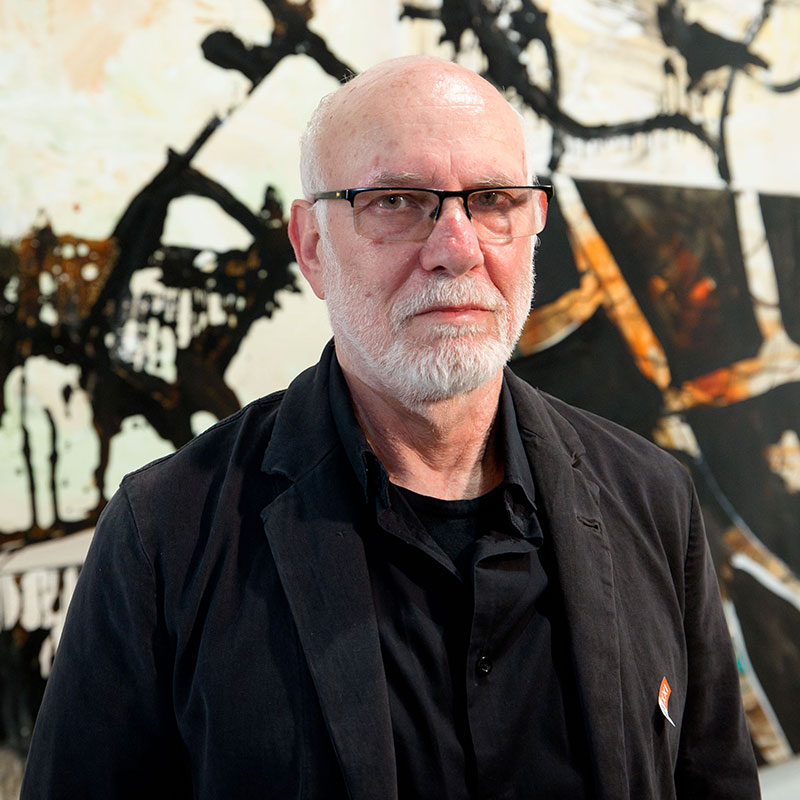
Tsibi Geva (Kibbutz Ein Shemer, Israel, 1951) lives and works in Tel Aviv and New York. Of Ashkenazi Jewish origin and son of one of the leading exponents of the Israeli Bauhaus, he is among the best known interdisciplinary artists on the national contemporary scene. An artist with a strong expressionist trait, since the late 1970s he has presented his personal reflections on culture, philosophy and mysticism, placing the exploration of his own identity and that of his country at the centre of his work. His artsimultaneously addresses the political situation in Israel, the psychological consequences of the ongoing conflict and the resulting aesthetics.
Where I Come From is a modular painting made up of canvases of different sizes presented as a collective unit and arranged holistically.Each canvas is therefore independent, but together they create connections and disconnections: through abstraction and repeated motifs, these works are a metaphor for the chance encounters and decisions that led the artist – as well as many others – to return to live in Israel.
The piece sums up recurring motifs in Geva’s works: the repetitive pattern of the keffiyeh, balatot tiles, fences – typical of the reality of living in a socio-politically complex environment – and the theme of the border that characterizes life in a situation without a clear territorial definition. These elements unfurl rhizomatically in different and unexpected directions and contexts, with lines that form a sometimes endless road map, packed with continuities and disconnections.
Geva’s proposal shows how human experience is complex, evocative of kindness as well as conflict, and always destined to be accepted on its own terms.
photo: Musacchio, Ianniello, Pasqualini & Fucilla
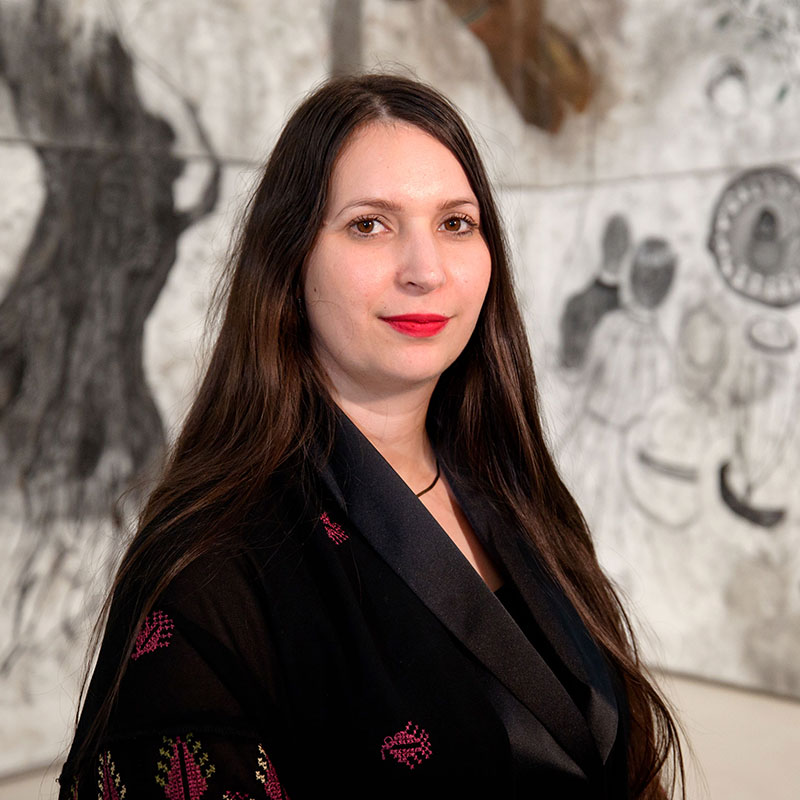
Maria Saleh Mahameed (Umm el-Fahem, Israel, 1990) lives and works in Ein Mahel, Israel. Born to a Ukrainian Christian mother and Palestinian father, and raised in Israel’s most populated Arab city, the artist embodies this complex identity in terms of nationality and religion. Her works, with their highly personal style, recreate intimate yet political narratives about Palestinian society. Black charcoal – a material typical of Umm el-Fahem (“Mother of Charcoal”) – dominates Saleh Mahameed’s work. This technique creates an intimate and visceral expressiveness, revealing the direct contact of the artist’s fingers on the canvas to the viewer.
The work on display, Ludmilla, describes an imaginary landscape that combines references to the cities of Umm el-Fahem and Kyiv, the birthplace of the artist’s mother after whom the piece is named. This is the first chapter in a series dedicated to the story of the artist’s parents, in this case depicting memories of her mother, a young Ukrainian woman who was driven by love to move to a society with a strong Palestinian cultural identity. Like memory itself, the exhibition narrative is not a linear retelling, but a fluid collection of images in which Soviet landscapes blend with Middle Eastern panoramas, featuring motifs ranging from Palestinian olive trees to Misha, the mascot bear of the 1980 Moscow Olympics.
Ludmila is a work about motherhood and intergenerational relations, set in different places around the world and marked by the identities and people closest to the artist.
photo: Musacchio, Ianniello, Pasqualini & Fucilla
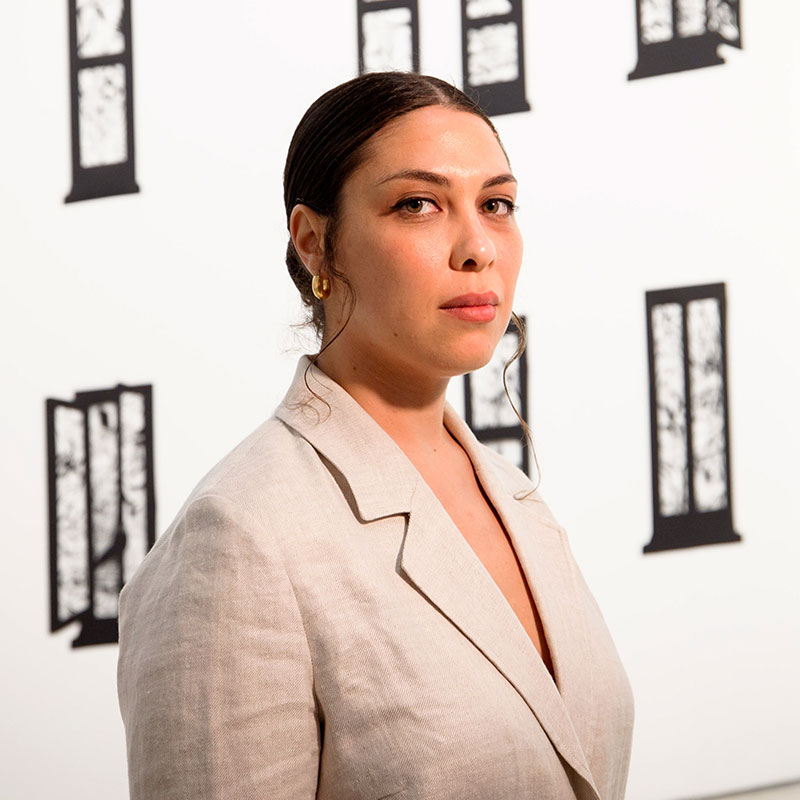
Noa Yekutieli (Los Angeles, California, USA,1989) is a self-taught multidisciplinary artist born to a Japanese mother and Israeli father, who lives and works in Tel Aviv, Israel, and Los Angeles, USA. Yekutieli’s interdisciplinary practice, combining sculptural elements, objets trouvés and the art of Japanese paper cutting, seeks to reconcile her often conflicting identities as a Japanese-Israeli-American woman by examining the tensions between human experiences and multicultural perspectives. In her work, Yekutieli combines different approaches to the depiction of space, forcing visitors to observe her works from different perspectives and causing them to constantly question the interpretation of the work itself.
Where We Stand, the installation featured in the exhibition, consists of cut-out paper windows that frame an amalgam of heterogeneous images evoking at one moment a natural landscape, at another a landscape of destruction and conflict. Together with the optical illusion created by the windows, this leads us to continuously probe our reading of the work and the perspective relationships between the elements composing it.
This distortion seeks to make visitors reflect on how the space around them can change their perception of themselves and society, while at the same time it invites them to examine subjective socio-political visions, showing how perception can be much more flexible than we think.
The installation questions people’s propensity to selectively open and close their eyes to reality, and to mask or deny the truth in order to survive
photo: Musacchio, Ianniello, Pasqualini & Fucilla
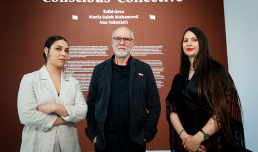
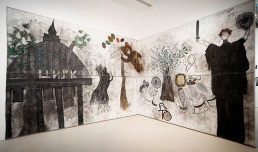
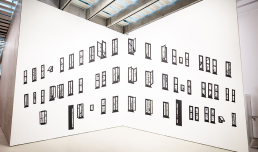
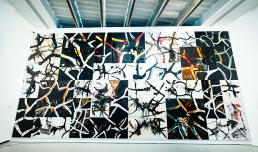
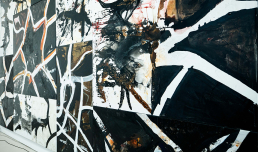
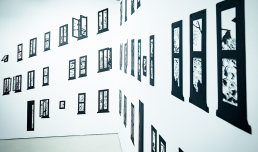
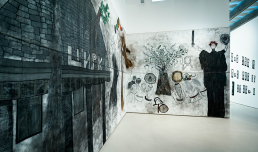
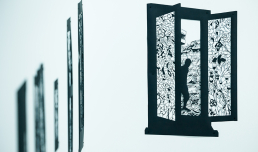

The works of Tsibi Geva, Maria Saleh Mahameed and Noa Yekutieli show a complex cultural reality, between identity and place, memory and ties.
The origins, influences, sensitivities, and even the techniques and materials favoured by the three artists differ. Yet their works reveal unexpected connections. The works on display are rooted in individual biographies and recount intimate yet universal experiences.
Tsibi Geva (Israel, 1951), of Ashkenazi Jewish origin, son of one of the leading exponents of the Israeli Bauhaus, is an established and internationally renowned artist who lives and works between Tel Aviv and New York; Maria Saleh Mahameed (Israel, 1990) born and raised in Israel’s most populated Arab city, is the daughter of a Palestinian father and a Ukrainian-Christian mother; Noa Yekutieli (USA,1989) is a self-taught multidisciplinary artist born in California to a Japanese mother and an Israeli father, who divides her time between Tel Aviv and Los Angeles.
Recalling the Jungian concept of the ‘collective unconscious’, an inheritance belonging to the distant past and common to all humanity, Conscious Collective investigates how it is possible to rediscover a sense of collectivity even in a land where conflict is a constant and how accepting life with its contradictions may be the key to a better existence.
header: Noa Yekutieli, Blind Spot (detail), 2021. Manual paper-cutting. Photo credit: Sharon Pulwer
on show
Tsibi Geva
Maria Saleh Mahameed
Noa Yekutieli